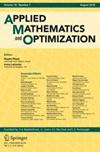磁弹性系统的正则性与稳定性
IF 1.7
2区 数学
Q2 MATHEMATICS, APPLIED
引用次数: 0
摘要
我们考虑在有界参考构型\(\Omega \subset \mathbb {R}^n\)中的板的数学模型,首先考虑与\(n=2\)磁场相互作用的\(n=2\)。后者有阻尼作用。我们将证明,产生的系统产生一个解析半群,如果n个常数定向磁矢量趋于线性相关,则估计的指数衰减率趋于零。然后,将考虑\(n=3\)的类似模型。在磁场小于n的情况下,我们举例证明了立方体的强稳定性。本文章由计算机程序翻译,如有差异,请以英文原文为准。
Regularity and Stabilization of Magneto-Elastic Systems
We consider the mathematical model for a plate in a bounded reference configuration \(\Omega \subset \mathbb {R}^n\), first with \(n=2\), which is interacting with \(n=2\) magnetic fields. The latter have a damping effect. It will be shown that the arising system generates an analytic semigroup and that the estimated exponential decay rate tends to zero if the n constant directing magnetic vectors tend to become linearly dependent. Then, an analogous model for \(n=3\) will be considered. In the case that there are less than n magnetic fields we prove the strong stability exemplarily for cubes.
求助全文
通过发布文献求助,成功后即可免费获取论文全文。
去求助
来源期刊
CiteScore
3.30
自引率
5.60%
发文量
103
审稿时长
>12 weeks
期刊介绍:
The Applied Mathematics and Optimization Journal covers a broad range of mathematical methods in particular those that bridge with optimization and have some connection with applications. Core topics include calculus of variations, partial differential equations, stochastic control, optimization of deterministic or stochastic systems in discrete or continuous time, homogenization, control theory, mean field games, dynamic games and optimal transport. Algorithmic, data analytic, machine learning and numerical methods which support the modeling and analysis of optimization problems are encouraged. Of great interest are papers which show some novel idea in either the theory or model which include some connection with potential applications in science and engineering.

 求助内容:
求助内容: 应助结果提醒方式:
应助结果提醒方式:


